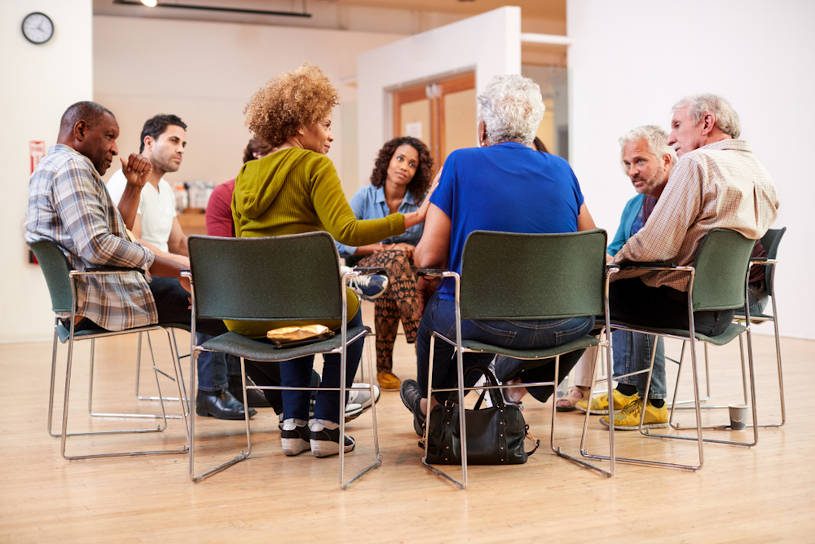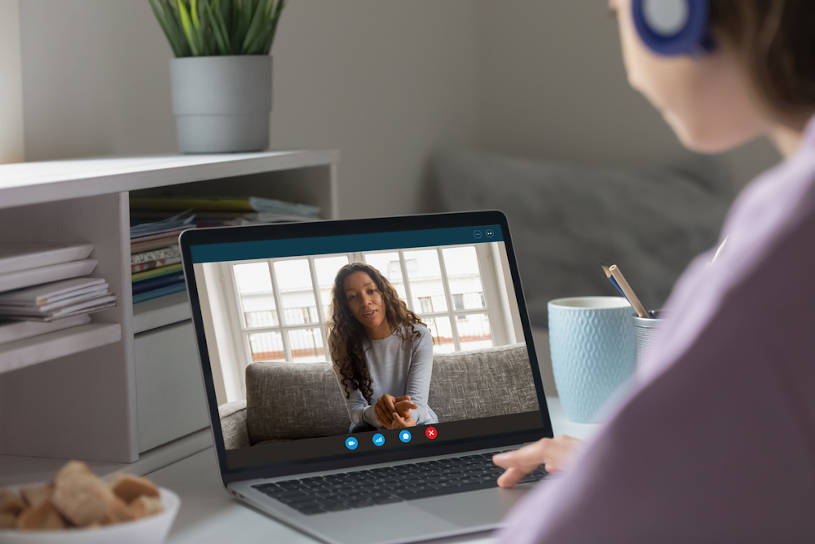Hope Without Commitment
Find the best treatment options. Call our free and confidential helpline
Most private insurances accepted
How To Find Support Groups Near Me?
As a person seeking a group of people who are going through or have gone through the same thing as you, it might seem as if there are no groups nearby. That is not accurate, as there are thousands available to access all over the United States and the world as a whole. No matter the kind of condition one is dealing with, they always have the chance of finding support groups near me filled with similar people.
For Addiction
There are many well-established groups available for those battling substance abuse and addiction.
- Alcoholics Anonymous (AA): This is arguably the most popular and well-established support group out there. It is a 12-step program that motivates people to quit drinking via meetings and mentorship.
- Cocaine Anonymous: Similar to AA, Cocaine Anonymous provides a supportive platform for those who deal with cocaine abuse and are trying to kick it out of their lives.
- SMART Recovery: This is a self-help program that focuses on helping people who have had their lives impacted by their substance or drug use problems. It focuses on self-empowering these individuals to make the changes they need to achieve recovery.
- Marijuana Anonymous: Just like the other 12-step programs, joining an MA program is entirely free. People can find hope and strength in one another to overcome marijuana addiction they deal with.
- Narcotics Anonymous: Those dependent on any kind of narcotic can turn to Narcotics Anonymous to provide a support system for them during their attempt at recovery.
- Women for Sobriety: For those looking for support groups for women, Women for Sobriety is the one. It focuses on substance use disorders of all kinds, intending to help members reach sobriety.
- Dual Recovery Anonymous: Many people with a substance use disorder suffer from mental health conditions at the same time. Dual Recovery Anonymous recognizes that fact and provides a platform for these people to obtain two-pronged support in a single location.
For Families of Addicts
Relatives and loved ones of those dealing with addiction have to go through a lot, but there is little spotlight placed on their struggles. These support groups for families of addicts provide a means for them to find strength in their circumstances.
- Nar-Anon: For the loved ones affected by a person dealing with addiction, Nar-Anon is a 12-step program that empowers them to be stronger through shared experiences. Narateen is an offshoot to help teenagers dealing with the same.
- Al-Anon: Al-Anon is the best option for those who have had their lives affected by an alcoholic in it. Alateen is a similar peer support program for teens who suffer from an alcoholic in their lives.
- Families Anonymous: This is a 12-step program targeted toward family members and friends of people with substance use disorders.
- Adult Children of Alcoholics: Growing up in a home with an alcoholic can have immense effects on children, and the effects may persist into adulthood. ACOA is a 12-step program that supports individuals who have experienced such.
Sending an email and contacting support groups for families of addicts provides people with great resources to learn from and get information. However, it is essential to keep in mind that these programs and groups are never a substitute for professional addiction treatment and help.
Behavioral Addictions Recovery
There are many behavioral addictions that do not involve the use of substances. They, too, have well-established groups.
- Overeaters Anonymous: This community supports those dealing with or recovering from eating disorders of any kind.
- Sexaholics Anonymous: For those who believe they have abnormal behavior regarding sex, lust, and pornography.
- Gamblers Anonymous: Gambling addiction is a problem for many. This program allows them to meet with several others trying to overcome the same.
- Workaholics Anonymous: Many people don’t focus on the dangers that excessive working can have on the self and loved ones. This free fellowship aims to strengthen those dealing with work addiction with the experiences of others.
It is, once again, pertinent that individuals dealing with unhealthy fixations or behavioral addictions seek professional treatment for these conditions. These programs and meetings are highly recommended but not as an alternative to treatment.
Emotional and Mental Health
Patients who deal with emotional and mental health conditions can rely on mental health support groups to help them cope and improve their symptoms.
- Depressed Anonymous
- Social Anxiety Anonymous
- PTSD Anonymous
- Mental Health Anonymous
- Schizophrenics Anonymous
What Are Support Groups?
These are groups of people who come together to discuss, share, and listen to experiences and concerns around a particular problem that they have in common. For instance, it can be cancer, depression, alcoholism, drug addiction, and many similar conditions. In fact, they are available for almost every medical condition and troubling life circumstance that people face. There are even programs for families of addicts.
While a self-help group might seem the same thing as a support group, there is a fundamental difference. A support group is moderated or organized by experts, either an agency or a professional in the field. A self-help group is comprised and managed by members with similar circumstances.
What To Expect
Those who have successfully found support groups near me may be curious to know the procedure before they eventually go for their first meeting. These meetings tend to follow a general procedure.
They tend to start with a moderator grabbing everyone’s attention, doing an introduction, and then prompting each member to introduce themselves. Following the introduction, the moderator may then look out for members who would like to get something off their chest or share it with the group.
It tends to go turn by turn, but there is no pressure or policy for participation. It is important for people to be able to take their time to contribute or not contribute at all if they’re not comfortable.
Types Of Support Groups
The fundamentals of a support group can be modified to allow for the creation of different types of support groups. These can help different people take care of different kinds of needs that they may have. They include the groups listed below.
Mutual
A mutual support group is a group of people dealing with the same life situation or medical issue. In these groups, there is a person assigned as the facilitator who receives training to take up that position. However, this training does not bestow them with a professional tag or the like. Their duties mainly entail them moderating the session.
In these groups, members share their experiences with their circumstances, support one another, and provide solutions and tips to help the other members with their problems.
12-Step Meetings
A 12-step meeting is similar to a mutual group as they are led by non-professional but trained facilitators. It makes them similar to self-help groups in that they are peer-led and not moderated by a professional.
Among the types of support groups, 12-step meetings can be considered the most suitable for people dealing with addiction. These addictions don’t necessarily need to be substance addictions, but they can also include gambling, sex, and even video game or social media addiction.
Therapy Groups
A therapy group differs from the preceding types as a professional therapist facilitates the events of a therapy group meeting. Individuals with similar issues are brought together, and the therapist can provide treatment to the entire group.
Those looking for mental health support groups will benefit the most from therapy groups. However, unlike the other types, they will typically come at a cost.
Support Groups For Women & Men
Some may wonder if there are exclusive support groups for women, or maybe men, that might make them feel safer when being vulnerable during sessions. The good thing is that there are such centers available.
Focusing on women, they cover a wide array of different conditions. Still, many of these tend to focus on those dealing with substance abuse problems, domestic or sexual violence, or mental health conditions such as depression or PTSD. However, there are also groups available for those trying to lose weight or dealing with losing a loved one. Examples of these are the Women for Sobriety or the Women’s Peer Support Group.
For men, there are also exclusive groups. Many men may prefer these kinds of groups as they can share their problems without the fear of being judged. It also allows for their treatment to be more focused on the biological and social peculiarities of being a man. Good examples include the Men’s Resource Center of West Michigan and ManKind Project USA.
Online Support Groups: Pros and Cons
Online support groups are very similar to the regular kind, with one of the significant differences being the fact that everything is held from the comfort of one’s home. By using video conference calls, the group can be moderated and carried out precisely as it might have been in person.
Online support groups can be a lifesaver for people who may have difficulty leaving their homes to find a physical support group venue. Not only that, but some people may feel safer or less anxious when engaging in a group meeting from a familiar, comfortable location, such as their bedroom. It is also very pertinent in the wake of COVID.
Online groups can be pretty beneficial as those participating don’t need to worry about the arrangements for transportation and the stress that comes with that. It also makes it easier to find a support group that works best for you instead of relying on the closest ones.
However, the social setting and contact with others are absent in online groups. Listening to support and advice from other people going through a condition tends to be more impactful when they are there in person. The support shown by other members may come off more flat than intended too. It should also always be kept in mind that technical issues can bring down an entire meeting.
What Are the Benefits?
By joining any of the support groups near me, a person can tap into several available benefits. They include the following:
- Gives those suffering from a condition or a circumstance a chance to vent and let out their frustrations. They also get the opportunity to ask questions and express concerns.
- A support group can help a person remain hopeful as to their chances of overcoming addiction by showing them others who walked down the same path and succeeded.
- People can learn based on the experiences of others in the group. Whether it is mistakes they might have made or tips or solutions they’ve discovered by suffering firsthand, these are all available to others in the group.
- With so many new people around, individuals are bound to get the chance to learn new exercises and techniques that they can use to deal with the stress that their circumstances can bring.
Remarkably, many studies have been performed to prove the efficacy of peer-led support settings. For instance, in the case of depression, peer support was shown to improve symptoms.
In 2006, a study showed that programs like Alcoholics Anonymous and Narcotics Anonymous helped with abstinence after treatment. 81% of those who regularly participated over the next two years after treatment remained abstinent. It was opposed to just 26% who never attended these programs.
A study from Stanford University also pointed to AA as being the most effective means for abstinence.
Another study evaluated 12 different programs for women who were victims of domestic violence six months after joining a group. They were assessed to be doing better in so many ways, such as self-control, stress, and marital functioning.
Obstacles to Joining a Support Group
It is entirely understandable that many people feel hesitant about joining a support group, despite the many benefits and its proven efficacy. Admitting a problem is difficult, and doing so to people they do not know can be harder.
There’s no shame in going for a meeting in a support program. Everyone there shares a common problem and understands the peculiar issues and problems one faces with their condition or addiction. There is so much to be gained by letting go and making the decision. Online support groups can help ease one into physical meetings. These programs can help find hope, strength, perseverance, and dedication to achieve recovery.
Those dealing with addiction or a medical condition should consider joining a support group as an addition to receiving professional treatment. Recovery can be difficult, but having the help of people who have gone through it before you can make it easier.
Page Sources
- Pfeiffer, P. N., Heisler, M., Piette, J. D., Rogers, M. A., & Valenstein, M. (2011). Efficacy of peer support interventions for depression: a meta-analysis. General hospital psychiatry, 33(1), 29–36. https://www.sciencedirect.com/science/article/abs/pii/S0163834310001982
- Women For Sobriety, Meeting Finder. https://womenforsobriety.org/meetings/
- Hébert, R., Lévesque, L., Vézina, J., Lavoie, J. P., Ducharme, F., Gendron, C., Préville, M., Voyer, L., & Dubois, M. F. (2003). Efficacy of a psychoeducative group program for caregivers of demented persons living at home: a randomized controlled trial. The journals of gerontology. Series B, Psychological sciences and social sciences, 58(1), S58–S67. https://academic.oup.com/psychsocgerontology/article/58/1/S58/566226?login=true
- Tutty, L. M., Bidgood, B. A., Rothery, M. A. (1993). Support groups for battered women: Research on their efficacy. Journal of Family Violence, 8, 325-343. https://link.springer.com/article/10.1007/BF00978097
- Stanford Medicine News Center, Alcoholics Anonymous most effective path to alcohol abstinence, 2020, https://med.stanford.edu/news/all-news/2020/03/alcoholics-anonymous-most-effective-path-to-alcohol-abstinence.html
- Vederhus, J. K., & Kristensen, Ø. (2006). High effectiveness of self-help programs after drug addiction therapy. BMC psychiatry, 6, 35. https://bmcpsychiatry.biomedcentral.com/articles/10.1186/1471-244X-6-35
Find Drug Rehabilitation Centers Near You Anywhere In the US
Addiction Resource team has compiled an extensive list of the top drug rehabilitation facilities around the country. Use our locator tool to find the best centers near you.








 FindTreatment.gov
FindTreatment.gov